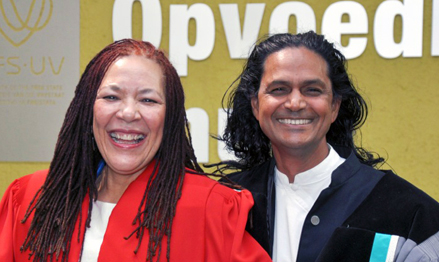Latest News Archive
Please select Category, Year, and then Month to display items
![]()
The Centre for Gender and Africa Studies (CGAS) and the UFS will host an Africa Day Webinar on the topic, Reflections on Africa amidst Covid-19, to be delivered by Prof. Sabelo J. Ndlovu-Gatsheni, renowned decolonial scholar. The title of his lecture is Revisiting the African idea of Africa during the moment of Covid-19 pandemic.
The crisis delivered by Coronavirus and Covid-19 invites Africans to rethink and even unthink the long-standing dependency on Europe and North America for help. What has dawned on Africa is the equally long-standing aspiration of self-reliance. What is emerging is a new African idea of Africa which takes responsibility for its own challenges. This new African idea of Africa challenges the Mudimbean idea of Africa embodied in the colonial library.
Thus this presentation reassesses how Africa has relied on its own historical experience, its own knowledge, and own people to confront Covid-19. What is of interest here is the proverbial wisdom of necessity being the source of invention. The presentation brings to the fore the decolonial turn as it gestures beyond crisis into post-Covid-19 world order. It ends with a call for decolonial love founded on new ethics of living together and new economies of care.
Bio of Prof Sabelo J. Ndlovu-Gatshen
Date: Tuesday, 26 May, 2020
Time: 14:00
Duration: 90 min max (45 min talk, 45 min Q&A)
The webinar can be accessed via one of the following links:
OR
Rhodes professor calls for accountability in teacher education
2013-11-14
|
 |
Prof Jean Baxen of Rhodes University and Prof Dennis Francis, Dean of the Faculty of Education of the UFS.
Photo: Stephen Collett
15 November 2013 |
Lecture (pdf)
“Our education system needs quality teacher education.”
This was the message from Prof Jean Baxen, Deputy Dean of Research at Rhodes University in Grahamstown. She delivered the Education Public Lecture on ‘The lives of children, citizenship and teacher education: challenges and opportunities’ at the University of the Free State’s Bloemfontein Campus.
Growing up in White River, the rural areas of Eastern Transvaal (as it was previously known), Prof Baxen took the audience on a journey of the imagination. She shared stories of how she and fellow learners walked miles to get to school and how her son found himself in a situation of being unsure about his own racial identity, questioning what it meant to be ‘coloured’. She also related stories of how teachers are not sufficiently prepared to mediate information on HIV/Aids.
These stories revealed how little teachers cared, and also how difficult and challenging it is for learners to cope in such teaching and learning environments – thus calling for quality teacher education.
She stressed the fact that quality teacher education is needed in South Africa to assist in curbing the challenges children and fellow citizens come across in our broader society. “It is important that, as teacher educators, we should groom teachers to find and understand their identity, sexuality, and also the world they live in. There is an urgent need for us to hold ourselves and others accountable and to not distance ourselves and make it someone else’s responsibility – it is our joint responsibility as citizens,” she said.
We need a pedagogy that would navigate and start formulating a language that we could use to face these challenges, she proposed.